Malawi
Culture Name
Malawian
Orientation
Identification. Malawians are part of the large Bantu population that migrated northward from South Africa at around the turn of the twentieth century.
Location and Geography. Malawi is a landlocked country that lies east of Zambia, north and west of Mozambique, and south of Tanzania. Its area is 45,747 square miles (118,500 square kilometers). The major topographic feature is Lake Malawi, a freshwater lake that is home to hundreds of fish species found nowhere else in the world. Twenty percent of the landmass consists of water. The topography varies from the high Nyika plateau in the north to the Shire River valley in the south that is an extension of the Great Rift Valley. In the far southeast corner is Mount Mulanje, which is among the highest mountains in Africa.
The capital, Lilongwe, is roughly in the center of the country. However, the major commercial center is Blantyre, named after the birthplace in Scotland of the first European to discover Lake Malawi, the English explorer Livingston. Access to the Indian Ocean is normally by rail to the port of Beira in Mozambique.
Demography. In 1999, the estimated population was ten million, with 45 percent of the population under age 14, and 3 percent over age 65. The population density is one of the highest in Africa. Among the major ethnic groups are Chewa, Nyanja, Tumbuko, Yao, Lomwe, Sena, Tonga, Ngoni, Ngonde, Asians, and Europeans.
Linguistic Affiliation. The most widely spoken language (60 percent of the population) is Chewa, which originated among the Bantu tribes of South Africa. Five percent of the people speak Yao, and 30 percent speak Arabic. The language of government, industry, and commerce is English, which every schoolchild studies. English is spoken in cities but rarely in rural areas.
History and Ethnic Relations
Emergence of the Nation. Evidence of Stone Age and Iron Age settlements has been found around Lake Nyasa. Bantu peoples moved into the territory in the first millennium C.E. By the sixteenth century, a Malawi kingdom had trade relations with the coastal areas of Mozambique.
Jesuit missionaries from Portugal visited the territory near Lake Nyasa in the seventeenth century, but the lake probably was not known to Europeans until the Scottish missionary and explorer David Livingstone reached its shores in 1859. European involvement began in 1875 and 1876, when Scottish church missions were established, and a British consul was stationed in the country in 1883. In 1891, treaties that had been negotiated with indigenous rulers resulted in the formal declaration of a British protectorate called the Nyasaland Districts Protectorate. Beginning in 1893, it was known as the British Central Africa Protectorate, and in 1907, the area was officially designated the Nyasaland Protectorate. In 1915, John Chilembwe, an African preacher, staged a short, bloody uprising in response to the treatment of Africans by British colonists.
After World War II, nationalist movements gained strength. After 1953, the protectorate was joined for ten years in a federation with Northern Rhodesia and Southern Rhodesia (now Zambia and Zimbabwe) called the Federation of Rhodesia and Nyasaland. That federation was opposed by nationalists who advocated political freedom from British rule. After the federation's dissolution in 1963, Nyasaland achieved internal self-government, with Hastings Kamuzu Banda as the first prime minister. The protectorate gained independence in 1964 under
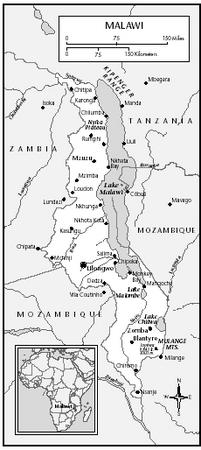
Under the Banda regime, the country embarked on a vigorous program of economic development. In international affairs, Banda maintained a policy of neutrality in the dispute between Great Britain and the government of Rhodesia (known as Southern Rhodesia before 1964), maintaining extensive trade relations with Rhodesia's rebellious white minority government. He also maintained friendly relations with Mozambique (until 1975 governed by Portugal) and in 1967 signed a trade pact with South Africa.
In November 1970, the constitution was amended to make Banda president for life. Maintaining good relations with white-dominated South Africa, he became the first black African head of state to visit that country. His policy toward South Africa brought criticism from other black African countries, and his influence in continental affairs was minimal.
The first parliamentary elections were held in 1978. Although only the Malawi Congress Party participated, a majority of the incumbent members were defeated; participation in the 1983, 1987, and 1992 elections also was restricted to that party. The economy performed sluggishly in the early 1990s, burdened by foreign debt and an influx of Mozambican refugees. Meanwhile, Banda faced rising domestic discontent and international criticism of his human rights record.
In May 1994, a new constitution was approved, and then the first multiparty elections took place. Bakili Muluzi, the leader of the United Democratic Front and a former federal cabinet member, defeated Banda for the presidency and formed a government dominated by that party. In keeping with the new constitution, which established a human rights commission, Muluzi freed political prisoners and closed three prisons where tortures was said to have taken place. In early 1995, Banda and a top deputy were tried for the 1983 killings of four government officials. Both were acquitted.
Dr. Hastings Kamuzu Banda, called Ngwazi, or ("Fearless Warrior,") had strong ties with and feelings for Britain. He modeled his government on the British Parliament and built Kamuzu Academy as a private school patterned after Eton. Only the brightest and wealthiest were able to attend; students were required to wear uniforms with straw boater hats and played cricket and rugby. The British influence still can be seen in driving on the left side of the road, roundabouts, speed bumps, and school uniforms.
Banda was revered by the general population, but most of the intelligentsia wanted him removed. Every government office had his picture on the wall. When he traveled within the country, streets would be closed and would be lined with schoolchildren waving flags and singing national songs. An audience with Banda would be extremely deferential, and servants were expected to enter and leave the
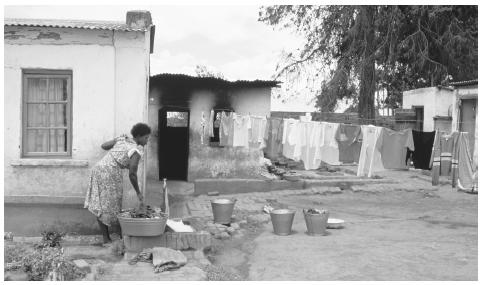
Ethnic Relations. The many tribes generally have gotten along well. However, there is a feeling that people from the north are more intelligent than their southern counterparts, and Banda mistrusted northerners, attempting to keep them out of public office and curtail their enrollment in Kamuzu Academy. Citizens feel a kinship with the neighboring countries and during the civil war in Mozambique created many refugee camps along the borders and fed the refugees with the country's reserves of corn. At that time, Malawi was one of the few African countries that could feed itself.
Urbanism, Architecture, and the Use of Space
Malawi has an agricultural economy, and even in urban areas, each home generally has a small plot of corn. There are three main cities. Blantyre, the commercial center, Lilongwe, the new capital, replacing Zomba; and Mzuzu in the far north. In 1990, the tallest building in the country was seven stories and the country had only four traffic signals. The vast majority of homes are constructed of sticks and mud with either a thatched roof or a roof of corrugated iron held down by stones. Families tend to build their homes close to each other in a small compound.
A typical home might consist of such a house with separate rooms for sleeping, eating, and storage. Cooking is done over a wood or charcoal fire in a separate building with a smoke hole in the roof. Furnishings are very simple, often homemade, with few decorations. Cow dung often is used to create the floor of the house. Bathing is done outside, often within a circular thatched shield with an open roof. Water is carried, often over great distances, from a lake, river, or well for cooking and bathing. In the larger cities, the water is potable.
Food and Economy
Food in Daily Life. Chickens, goats, and an occasional pig are used to supplement the standard dish of boiled cornmeal called nsima. Nsima is eaten twice a day, usually at lunch and dinner, and is preferred by most people to rice or potatoes. Fruits are plentiful, including mangoes, melons, oranges, bananas, and pineapples. Vegetables are cultivated but are not popular.
Soft drinks are quite prevalent, especially Coca-Cola. Alcoholic beverages are mainly beer (there is a large brewery in Blantyre), a homemade brew called chibuku, that is usually produced by women and served in cut-off milk cartons, and a more potent distilled liquor that often causes severe health problems.
Food Customs at Ceremonial Occasions. Most weddings and funerals involve the consumption of alcoholic beverages.
Basic Economy. In the last decade, the economy has gone downhill, the value of the kwacha has declined, and the rate of inflation is high. Malawi relies heavily on foodstuffs supplied by Western nations.
Land Tenure and Property. Land is treated as part of the public domain. A person may settle on a piece of ground, build a home, and grow crops as long as he gets the approval of his neighbors. After a certain period, he is permitted to register the plot with the government and is given legal title.
Commerical Activities. Malawi's economy is based largely on agriculture, which accounts for more than 90 percent of its export earnings, contributes 45 percent of gross domestic product (GDP), and supports 90 percent of the population. Malawi has some of the most fertile land in the region. Almost 70 percent of agricultural produce comes from smalholder farmers. However, land distribution is unequal with more than 40 percent of smallholder households cultivating very small plots. The country's export trade is dominated by tobacco, tea, cotton, coffee, and sugar. There is very little import trade. Tourism is beginning to build after the collapse of the repressive government of Dr. Banda, and plans are in place to build more resorts and restore the roads.
Major Industries. The organizations that produce coffee, tea, and tobacco, such as the British-American Tobacco Company, are replacing their British managers with Malawians. The country produces no manufactured goods for export; thus, the economy depends heavily on agricultural staples. During the years of apartheid, Malawi was the only country in Africa that had diplomatic relations with South Africa. Many South Africans visited the country, and a basic tourism infrastructure was developed. Today there are tourists from many countries, but the country does not have an abundance of wildlife and there are no game parks. However, there is a potential for increased tourism because of the natural beauty and varied topography and because the country is unspoiled and inexpensive.
Trade. The major exports are tobacco, coffee, and tea. The country imports electrical appliances, small machinery, and automobiles, primarily Japanese. The balance of trade is favorable. The major trading partners are Germany, the United Kingdom, the United States, Zimbabwe, Japan, and South Africa.
Social Stratification
Classes and Castes. People from the northern region have a reputation for being better educated and more skilled in business. For this reason, they are mistrusted by people from the southern two-thirds of the country and efforts are made to keep them out of government positions. Men dress in a Western style, wearing shirts and trousers, women often wear traditional costumes consisting of two or three chitenjes, which are large pieces of colored fabric used as a skirt, a headdress, and a saronglike wrap that holds a small infant on the woman's back. One way to distinguish between the three regions is by the color of the dress; red, blue, and green represent the north, central, and southern regions, respectively.
Symbols of Social Stratification. Shoes are expensive and often the local people are barefoot even in the cities.
Political Life
Government. Malawi is now a multiparty democracy, instead of a dictatorship with one party. Citizens and those resident for more than seven years can vote. The president is both the chief of state and the head of the government. He appoints a twenty-eight-member cabinet. The judicial branch consists of a Supreme Court of Appeal, a High Court, a chief justice appointed by the president, additional judges appointed on the advice of the Judicial Service Commission, and magistrate's courts. The legislative branch is made up of the National Assembly with 177 members elected by plurality vote from single-seat constituencies for a five-year term. The Senate contains eighty members, all elected. Local government consists of twenty-four districts.
Leadership and Political Officials. The three major political parties are the Malawi Congress Party (MCP), the Alliance for Democracy (AFORD), and the United Democratic Front (UDF). The most recent elections were held in 1999; Bakali Muluzi of
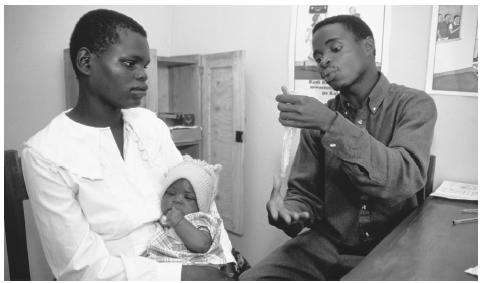
Social Problems and Control. The most serious crime is robbery, which generally occurs in the major cities and in tourist areas, although murder is not unknown. The police are conspicuous by their lack of weapons and vehicles. Local justice often is meted out on the spot. If a criminal is caught by local residents, he often is taken to the police station and beaten on the way while those around him sing and mock him. These beatings have caused death on occasion. During Banda's rule, there was a youth group that could turn violent. Its purpose was to intimidate the people into joining Banda's political party. The group members would stand at bus stations and prevent people from boarding until a membership card was produced or purchased.
Military Activity. The armed forces total about ten thousand, plus a paramilitary police force of about fifteen thousand. The army is by far the largest branch; the air force is small, and the navy is practically nonexistent. During World War I, Malawi sent a substantial number of troops to serve as part of the Kings African Rifles. There is monument to that unit in the former capital of Zomba.
Social Welfare and Change Programs
International fraternal groups such as the Rotary Club, Lions Club, and Kiwanis have a presence in the country. In the agricultural sector, there are large, well-organized growers' associations for tea and tobacco.
Nongovernmental Organizations and Other Associations
In one of the world's poorest nations, many foreign nongovernmental organizations are present. Among them are Medicins sans Frontieres, Save the Children, World Vision, and several United Nations organizations, such as the United Nations High Commission for Refugees. There are volunteer organizations such as United States Peace Corps and similar groups from England, Canada, Japan, and Germany. The World Food Program helps with food distribution.
Gender Roles and Statuses
Division of Labor by Gender. In a patriarchal society, men do most work outside the home. However, with help from Western countries, women are being encouraged to start their own businesses.
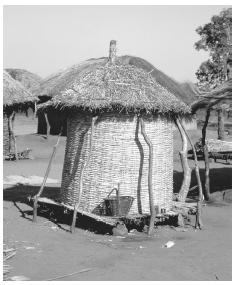
The Relative Status of Women and Men. When a family returns from the market or from gathering firewood or drawing water, women and children carry the burdens. The man leads the way, smoking if he can afford tobacco, with the rest of the family trailing behind. In a culture that separates the sexes in most aspects of life, three-quarters of literate persons are men. Usually, men eat separately from women, using the only table in the house. The woman serves the meal to the man, often on her knees. At weddings, it is customary for the bride to serve food to the husband's parents in that position.
Marriage, Family, and Kinship
Marriage. Marriages often are arranged, particularly in rural areas. Dowries are presented by the bride's parents to the husband to be and play a significant role in the selection of a partner. Dowries are usually in the form of livestock, such as cattle, goats, or chickens, but may consists of grain or land. Larger women often are favored as brides because they appear to come from a well-to-do family that can provide a significant dowry and seem strong enough to carry heavy loads. Polygamy is practiced occasionally by those who can afford it. On occasion, the co-wives will share the same house with the husband.
Females undergo an initiation ceremony at the onset of puberty or menstruation and just before marriage. It often consists of very explicit instructions on the sexual aspect of marriage. Divorce is becoming more common and is very difficult on the wife, who must go back to her family and hope it will take her in. The husband receives all the couple's possessions.
Domestic Unit. Families are quite close and often live in adjoining houses. Elderly persons are taken care of by their children, and usually the oldest members of a family have a strong voice in running the household and raising the children. Especially important is the uncle; male adolescents ask advice first of the uncle, who is also influential in the selection of a bride.
Socialization
Infant Care. Infants usually are carried on the mother's back, facing inward. Mothers conduct many activities with their babies in attendance: shopping, carrying water, hoeing a garden, and dancing in a ceremony. Separate rooms or cribs for infants are almost nonexistent because most houses are small and include many family and extended family members.
Child Rearing and Education. The average woman will bear five to six children, less than half of whom will live past the age of five years. Children are raised under strict family control, usually by the mother, until they leave home. They are expected to help with the chores of daily living. Most tasks are done by female children, such as carrying water, cleaning the home and washing dishes, and going to the market. Half the population over the age of fifteen can read and write, but education is reserved for those who can afford school fees and uniforms. Most children have to end their education before high school to help tend the fields or care for younger siblings.
Higher Education. College or even vocational training is rare, although Chancellor College has a good reputation and Queen Victoria Hospital, the largest in the country, has a school of nursing. Recently, a medical school was opened in Blantyre. However, those able to afford it usually send their

Etiquette
Verbal greetings are accompanied by a handshake. This is done with the right hand, with the left hand gripping the right forearm to show that one is not armed. Stopping to talk on the street is customary, and the conversation continues even after the parties go their separate ways. Although residents are gregarious, they respect other people's privacy in a crowded country where private space is at a premium. A person approaching someone's house will often cry Odi, Odi to announce his or her presence. Any visitor almost always is offered a drink and perhaps something to eat. Eating usually is done without utensils, but only with the right hand, because the left hand is considered "dirty."
Religion
Religious Beliefs. Fifty-five percent of the people belong to the Church of England but there are also Methodists, Baptists and Seventh Day Adventists. Twenty percent of the population are Muslim, and 20 percent are Catholic. There is a small Hindu presence.
Rituals and Holy Places. Most larger towns have a Christian church and a Muslim mosque. Most major cities also have a Hindu temple. In rural areas, animistic religion is practiced.
Death and the Afterlife. Because of the short life expectancy, the growing incidence of AIDS and other diseases, and the high infant mortality rate, death is a constant presence. Employers give workers time off for funerals, and funerals and mourning can last several days.
Medicine and Health Care
There are hospitals as well as a school of Medicine and several schools of nursing. The best hospital is probably the Seventh-Day Adventist Hospital in Blantyre, which also has a dental clinic. Queen Elizabeth Hospital in Blantyre is the largest in the country but is not particularly sanitary.
Medicine men and women provide health care for many people, especially in rural areas, using traditional or folk medicine. Sometimes called
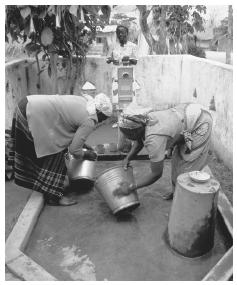
Yellow fever and malaria are prevalent, and the country has one of the highest incidences of AIDS in the world. Despite some efforts by the government, it has been difficult to lower the rate of AIDS because of long-standing social mores.
Secular Celebrations
The three major national holidays are Independence Day, 6 July; Republic Day, 6 July; and Constitution Day, 18 May. Independence Day celebrates the end of the British colonial status in 1964, Republic Day commemorates the formal declaration of the republic in 1966, and Constitution Day celebrates the drafting of the first constitution as a democratic society in 1995.
The Arts and Humanities
Support for the Arts. Malawi has built a National Dance Troupe over the past few years which has been well received. It is partially subsidized by the government and receives the only governmental financial support to the arts in the country.
Literature. There is a long tradition of oral artistry. Before the spread of literacy in the twentieth century, texts were preserved in memory and performed or recited. Those traditional texts provided entertainment, instruction, and commemoration. However, no distinctions were made between works composed for enjoyment and works with a more utilitarian function. Those works were primarily, myths, legends, and folktales.
Performance Arts. The performing arts are not highly developed. Local bands, that use primarily native instruments play throughout the country at festivals and celebrations but seldom travel abroad. Dance troupes are becoming more popular; their performances relate stories of everyday life. Some of the most popular are episodes involve a policeman, with uniform and whistle, who directs people by alternating verbal and whistle commands.
Graphic Arts. Wood carving and pottery making account the items most frequently purchased by tourists and Africans. Every home has one or more wood statues, generally of people or animals, along with elaborately carved tables and chairs. Every large town has carvings for sale, even in the supermarkets. The best pottery is said to come from Dedza on the Mozambique border. These pieces are often hand-painted with scenes, such as fishing boats on Lake Malawi at sunset.
The State of the Physical and Social Sciences
Lack funding has constrained the development of the physical and social sciences. The University of Malawi (also known as Chancellor College) has a good reputation, but the staff is poorly paid and the facilities are not kept up to date. The Polytechnic University in Blantyre relies on highly paid foreign professors.
Bibliography
Chanock, Martin. Law, Custom and Social Order: The Colonial Experience in Malawi and Zambia, 1998.
Crosby, Cynthia A. Historical Dictionary of Malawi, 1993.
Glagow, Manfred, et al. Non-Governmental Organizations in Malawi: The Contribution to Development and Democratization, 1997.
Hanna, A. J. The Beginnings of Nyasaland and Northern Rhodesia, 1859–1895, 1982.
Mandala, Elias C. Work and Control in a Peasant Economy: A History of the Lower Tchiri Valley in Malawi, 1859– 1960, 1990.
Michie, W. D. et al. The Lands and Peoples of Central Africa, 1981.
Mtewa, Mekki. Malawi Democratic Theory and Public Policy, 1986.
Muyebe, Stanslaus C. The Catholic Missionaries Within and Beyond the Politics of Exclusivity in Colonial Malawi, 1901–1945, 1999.
Needham, D. E. From Iron Age to Independence: A History of Central Africa, 1984.
O'Toole, Thomas. Malawi in Pictures, 1988.
Rotberg, Robert I. Rise of Nationalism in Central Africa: The Making of Malawi and Zambia, 1873–1964, 1965.
Schoffeleers, J. Matthew. River of Blood: The Genesis of a Martyr Cult in Southern Malawi, C. A.D. 1600, 1992.
Shepperson, George, and Thomas Price. Independent African: John Chilembwe and the Origins, Setting and Significance of the Nyasaland Native Rising 1915, 1987.
Sindima, Harvey J. The Legacy of Scottish Missionaries in Malawi, 1992.
Sweeney, Mary E. The Proper Care of Malawi Cichlids, 1993.
Williams, T. David. Malawi: The Politics of Despair, 1978.
Wills, Alfred John. An Introduction to the History of Central Africa: Zambia, Malawi and Zimbabwe, 1985.
Woods, Anthony, and Melvin E. Page. The Creation of Modern Malawi, 2000.
—B RUCE H. D OLPH
Mary
I am looking for my Grand-Fathers Family,he came to South Africa in the 1940`S,The only thing we know is that he was from Lilongwe in malawi,his names were Sanako Gedion Dube,but we know that Dube is not his real surname,which makes it more difficult.He had 5 kids in botswana,of which my father was one of them,then he moved to Natal and had 3 Boys,then moved to Johannesburg where he had 5 more kids,He passed away in 2008 and he was buried here is Johannesburg because no one knew where or who to contact,If anyone recognised the names SAMAKO GEDION,pLEASE HELP.I would really like to know where I originate from.
I think it really works and it is true
let us learn alot
My lovely mother land malawi.
I was most impressed with story he told about growing up he thought little people lived inside a radio that spoke & sang. When his folks went to church on sunday he took back off radio to meet the little people. They didn't look like people. He pinched the tube to hear it say "stop that". That is how he learned to fix radios by replacing tubes. He is a genius with a sense of humor.
The writer is also silent on why graeat malawian men like John Grey Kufa (Medical Assistant) & John Chilembwe resisted the brutal British oppression is also silent on how many schools build by John Chilembwe and the coffee he planted.
It is also silent on the life and status of Malawians during the British rule but i tell you they we much better in Kamuzu time.it also silent on why the economy started going down hill after 1994 but its because the west told Bakili to sell all companies built by Kamuzu (Privatization Commission).All the companies went indians who reduced the number of workers to and gave the miger (Minimal) wages.The Indians concentrate on profits and exploitation instead of what the companies were intended for to build the economy.
He name my mother Amina & my brother Adam.